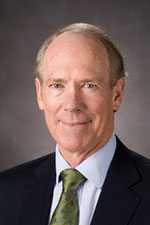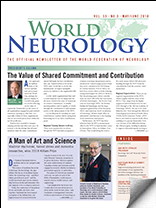As we approach the halfway mark of the current calendar year and as many watched the World Cup, perhaps the greatest display of a world team game, it is worth reflecting on the value of teamwork. Teamwork is at the center of all organizations engaged in goal-oriented endeavors, sporting or otherwise. It is especially evident in those organizations that are successful and in those within the not-for-profit area.

William Carroll, MD
Teamwork is essential to energize existing activities and drive new ones: At its heart is the knowledge that all team members share the same commitment and all will make the best contribution they can. Teamwork has a role in the WFN, and I would like to review this fundamental, yet largely intangible, essence in relation to our organization this year.
A solid, stable organizational base and a sound financial state are important but the most critical is the sense of teamwork, of a shared commitment, of reliable interdependence and of equality of worth through the contribution of each member society to the advancement of the WFN.
Let me illustrate by touching on some contributions. I preface this by saying how heartening it is to see these contributions grow.
Regional Training Centers in Africa. These were initiated first in Africa, though the WFN has had a program to evaluate neurology departments and institutions for a much longer period when they were commenced by Ted Munsat in Central America. Now in Africa, we have four centers either actively training young neurologists for Africa or about to. But the pleasing aspect about contributions are those offered by the Association of British Neurologists , the Societe Francaise de Neurologie (SFN), the Società Italiana di Neurologia, and the large regional organizations of the European (EAN) and American (AAN) Academies of Neurology. All have made offers of substantial contributions to the funding of the institutions and trainees.
Furthermore, the WFN has been informed that the SFN is preparing an offer for the WFN to fund another center in francophone Africa, in Abidjan, Cote d’Ivoire. This would bring the total to five such centers which will all receive funding through the WFN from the contributions from the societies I have mentioned.
Regional Organizations. There are six regional organizations in the WFN, which roughly matches those of the WHO. They range from the highly organized and well-financed AAN and EAN through to the African Academy of Neurology (AFAN), the last to be established in 2015. Now through the efforts of Neurological Association of South Africa (NASA) led by Lawrence Tucker, AFAN has its own bank account in South Africa enabling it to operate financially. However, because of the difficulties facing the African region, funding by pharma to support a biennial regular meeting is nigh on impossible at present. Such a lack of an income stream could jeopardize the future of AFAN.
Through the thoughtful teamwork of WFN member societies and individuals, promising discussions continue that should enable AFAN to maintain its development for the good of African neurology. The meeting planned for 2019 in East London, South Africa, will be held in conjunction with NASA, and thereafter additional collaboration is being planned.
World Congress of Neurology. As we all know, the 2019 WCN will beheld in Dubai and hosted by the Emirates Neurology Society (EMINS). We also know how important the WCN is to the WFN. It forms a major component of the WFN income along with the royalties from our publication, the Journal of Neurological Sciences (JNSci) and the annual subscriptions or dues from member societies. Any competition to the WCN from regional meetings has the potential to threaten the profitability of the WFN and consequently its educational programs and activities.
So it was with much pleasure that the WFN received the news that the Pan Arab Union of Neurological Societies (PAUNS) and its affiliated regional organizations have moved or cancelled all meetings in the region with the potential to compete with the 2019 WCN. While such a sacrifice by a regional organization has occurred previously it is still most heartening to see it in operation once more. Again, this reveals the actions of a team at work.
Annual Subscriptions. I have already mentioned the importance of the WFN income above. In this same sense of shared commitment and contribution, I encourage all member societies to view their annual subscriptions (known as dues) as being part of the team. While the amounts vary according to the numerical size of the member society, the very act of contributing establishes a sense of equality which in turn builds the morale of an organization. Furthermore, without funds the WFN cannot function.
On the Move. Within the London Office, there is the same sense of teamwork. As the office settles into its new operating calendar and record system (Asana), it can now look more externally. The WFN is most appreciative of the efforts of Chiu Keung Man for his direction on this and to the other office staff in general for their cheerfulness in continuing to keep everything functioning while the transition occurs. One of the more tangible features of an organization is its visibility. Logos, trademarks, and livery are the modern-day equivalents of flags and colors. They evoke a sense of pride and familial cohesion and represent the combined efforts and contribution of the organization’s many parts.
The London office is carefully reviewing all of the WFN logos and symbols on all platforms and media with which the WFN is seen so that it is immediately apparent to all viewers that an item, an article, a meeting, or a post on social media is from the WFN. Getting this right is fundamental to our visibility in the competitive world in which we exist and in signaling to our team that we do care how we are represented.
Your contribution to the WFN at the individual, member society, regional organization or WFN committee is crucial. Without it and the sense of equality of contribution, we will struggle to succeed.
Global Matters. I have mentioned in passing in my first column this year and in my statement of candidature in World Neurology last year of the desire for the WFN to develop a comprehensive registry of the needs of all member societies. This will become the Needs Registry. It will require the cooperative involvement of each of the regional organizations and their member societies in its preparation. In turn, it will provide an active survey of what is required to improve the delivery of neurological care. This will be the converse or opposite of what the WFN/WHO Atlas contains, which is the listing of resources available in each country and was obtained from a non-uniform range of sources and as such is less meaningful. Furthermore, the EAN is re-evaluating its survey of national neurological resources, the AAN plans a disparity file on its resources within the U.S., and the WHO announced at the 71st World Health Assembly in Geneva in May that it recognizes the inequality of access to health care and is preparing a more detailed and accurate inventory.
Together, if they all come to fruition, we will have a better overview of the needs, the basis for models of remedial action, and a potentially powerful tool with which to advocate for change at governmental and global levels.
At a larger scale of cooperative action is the informal support for a Global Neurology Alliance. During June’s EAN in Lisbon, there was encouraging support for the amalgamation of the World Brain Alliance and the Global Neurology Network, recognition of more regular communications to all through the WFN, and a suggestion of a more sustained and professional promotion of brain and neurological health. Clearly much needs to be done here but the sentiment of the need for teamwork at this level appears to be in line with that expressed by all neurological organizations.
Important Upcoming Events
World Brain Day (WBD)
Mohammed Wasay and his World Brain Day (WBD) team have again prepared numerous activities for individual member societies to join with to celebrate the formation of the WFN on July 22. This year, the theme is Clean Air for Brain Health (and healthy brain development).
WFN Annual General Meeting
The WFN Annual General Meeting will be Oct. 9 in Berlin during ECTRIMS. Not only must the WFN satisfy the requirements of the U.K. Charity Commission and ratify its financial position, there are also important elections.
Wolfgang Grisold’s four-year term as secretary general ends on Dec. 31. By being nominated by the Mexican, Moldavian, Moroccan, Romanian, and Italian societies, he offers himself for a further term.
The three-year term of Morris Freedman, elected trustee, is at an end, and he has offered himself again as a candidate. Three other candidates have been approved by the Nominating Committee and its outgoing chair, Marianne de Visser. All of the candidate statements are in this edition and can also be found on the WFN website. •
Bill Carroll
President, World Federation of Neurology

